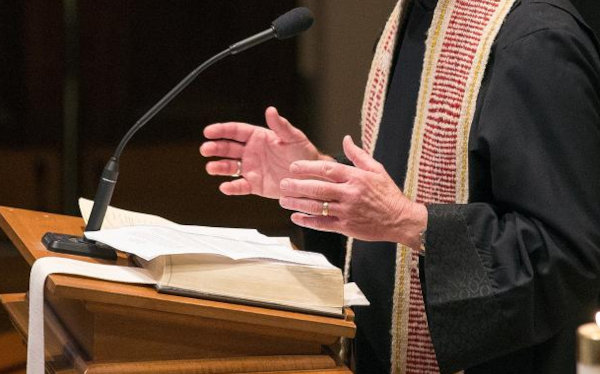Duke Divinity School professor considers what to take to the pulpit when something bad happens.
DR. RICHART LISCHER
United Methodist Communications
Preaching takes the time and occasion seriously. The preacher exercises a public ministry; it is expected that the sermon will address common crises, desolation, and grief with the Word of God. Catastrophes come in all sizes; some, like the burning of a church or the wreck of a church-school bus, are local and have a direct impact on the congregation; others, like war or the assassination of a president are national or global. Some events, like hurricanes, have regularly recurring precedents; others, like the destruction of the World Trade Center and the attack on the Pentagon, are without precedent.
- Don’t try to encompass the meaning of the event. Although you are expected to reflect upon it by means of God’s Word, you aren’t expected to explain it or to have mastered its significance.
- Don’t be too quick to extrapolate on the implications of the event. Here the preacher is merely relying on TV analysis and conventional wisdom, both of which are available outside the church.
- Don’t get caught up in the heat of the moment — in anger or fear — or lose yourself in the powerful emotions generated by the catastrophe. When possible, try to be the “non-anxious presence” of which pastoral counselors speak.
- Theodicy, “to justify the ways of God to man” as Milton put it in Paradise Lost, is not easily or wisely done in the midst of a crisis. You don’t have to know everything and explain it from God’s point of view. There will be time for such discussions to be carried out in a spirit of compassion and humility.
- To say too quickly that “good will come from this” may inadvertently dilute the tragedy and cheapen the suffering of the survivors. Joseph said to his brothers, “You meant it for evil, but God meant it for good,” only after an interval of many years.
- Try to do pastoral care from the pulpit. Reflect the needs of the community; don’t express your own grief, fear, or anger before thoroughly and compassionately engaging that of your listeners. Avoid the ironic mode entirely. Shun sentimentality or the artificial enhancement or exaggeration of emotion. Dwell on the hope and comfort of the Gospel. Your congregation already has found its focus; avoid extraneous illustrations.
- Preach the incarnate Jesus Christ, God’s definitive identification with the suffering of the world. Like those who perished this week, he was not granted a “good death” free of torture and terror. The death and resurrection of Jesus mark both the groaning of the old creation and the beginning of the new.
- Preach the bridge of God over the chasms of history. Jesus said, “I am Alpha and Omega, the beginning and the end.” God’s love in Christ spans the best and the worst humans are capable of. God’s reign over history does not absolve us from making a witness amongst the terrors of history.
- Preach the God who does not forget us or forsake us, the One who assures us that a mother cannot forget her nursing children — “Neither will I forget you.” Let the plain words of Scripture mediate the power of God through the sermon.
- There is a time to choose sides. Not all suffering stems from “neutral” causes like floods and hurricanes. The preacher asks “Whose story do we belong to?” The story of Jesus is incompatible with the glorification of guns and violence. It is incompatible with so-called “rights” that disregard the health of the human community. Let the sermon model, or, at least, foreshadow, the distinctively Christian way of life in a violent world. Let the sermon speak truth, make peace, and minister to the unprotected. May our sermons always serve the overarching purpose for which we have been given our holy vocation.
These suggestions were originally created in the aftermath of the terrorist attacks on 9/11 and were addressed as part of the Forum on Ministry During Crisis. They have been updated in response to the mass shooting in Las Vegas, Nevada, on October 1, 2017.
Richard Lischer is the James T. and Alice Mead Cleland Professor Emeritus of Preaching at Duke Divinity School and author of “The End of Words” (Eerdmans).
Last Updated on January 31, 2024

